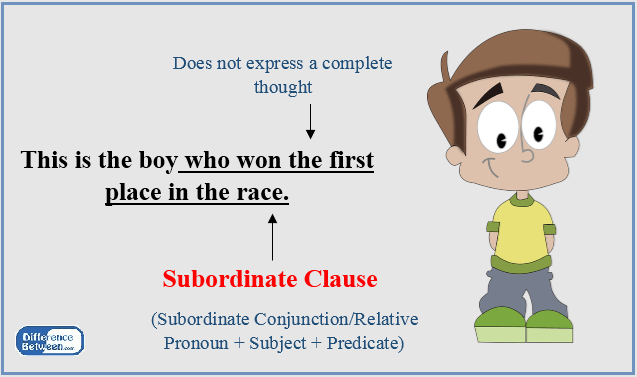The main difference between a main clause and a subordinate clause is that a main clause expresses a complete thought, while a subordinate clause does not. A clause is a group of words that contain a subject and a predicate. Clauses can be divided into two categories based on their ability to express a complete thought: main clause or subordinate clause. Because a main clause can convey a complete thought, it can stand independently. However, a subordinate clause depends on the main clause, as it cannot express a complete thought.
Key Takeaways
- A main clause expresses a complete thought and can stand independently.
- A subordinate clause does not express a complete thought and depends on the main clause.
- Both main and subordinate clauses contain a subject and a predicate.
What is Main Clause?
A main clause is a group of words that contain a subject and a predicate and can stand alone as an independent sentence. For example, in the sentence “He wanted to go to France because his mother was born there,” the underlined clause has a subject and a predicate, gives a complete meaning, and can stand as an independent sentence. Therefore, it is a main clause. Every sentence has at least one main clause, and some sentences can have two main clauses, called compound sentences, which are combined with a coordinating conjunction.
What is Subordinate Clause?
A subordinate clause, also known as a dependent clause, is a clause that does not convey a complete thought. A subordinate clause also contains a subject and a predicate, just like a main clause. However, a subordinate clause always begins with a subordinate conjunction or a relative pronoun and gives additional information about the sentence. Subordinate clauses can occur anywhere in a sentence.
What is the Difference Between Main Clause and Subordinate Clause?
The key difference between a main clause and a subordinate clause is that a main clause can express a complete thought, while a subordinate clause cannot. Because a main clause can convey a complete thought, it can stand independently. However, a subordinate clause depends on the main clause, as it cannot express a complete thought. Thus, a subordinate clause cannot stand alone as an independent clause.
Summary – Main Clause vs Subordinate Clause
Main clause and subordinate clause are the two main categories of clauses. A main clause can convey a complete meaning and can stand alone as an independent sentence. However, a subordinate clause always depends on the main clause, as it cannot convey a complete thought. This is the basic difference between a main clause and a subordinate clause.
